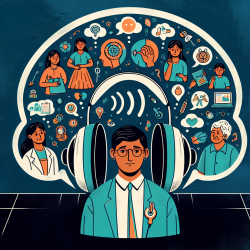Introduction
In the realm of healthcare for individuals with Intellectual and Developmental Disabilities (IDD), the integration of mental and behavioral health with primary care is not just beneficial—it's essential. The research article titled "Primary Care: Mental and Behavioral Health and Persons with Intellectual and Developmental Disabilities" highlights the critical need for this integration. As practitioners, understanding and implementing these findings can lead to significantly improved outcomes for children with IDD.
The Importance of Integrated Care
Data from the research shows that 35-40% of individuals with IDD also have psychiatric disorders, which can interfere with education, job readiness, and social relationships. Historically, these comorbidities were overlooked, but recent studies emphasize the need for integrated healthcare systems that cater to both physical and mental health needs.
Integrated care models, like the Developmental Disabilities Health Center (DDHC) in Colorado, demonstrate the benefits of combining primary and behavioral healthcare. These models not only improve patient outcomes but also reduce healthcare costs and increase accessibility to mental health services.
Challenges and Barriers
Despite the clear benefits, integrating care poses challenges. Barriers include reimbursement systems that do not support co-visitation, lack of care coordinators, and resistance to shared medical records. For practitioners, overcoming these obstacles requires advocating for policy changes and adopting innovative care models.
Implementing Integrated Care in Practice
- Advocate for Policy Change: Work towards modifying reimbursement models to support integrated care.
- Use Technology: Implement Electronic Health Records (EHR) systems that facilitate communication between different care providers.
- Collaborate Across Disciplines: Form interdisciplinary teams that include mental health professionals, educators, and social workers.
- Educate and Train: Ensure that all team members are trained in the unique needs of individuals with IDD.
Conclusion
For practitioners working with children with IDD, integrating mental and behavioral health into primary care is not just a recommendation—it's a necessity. By embracing integrated care models, practitioners can improve the quality of life for these children and their families. To delve deeper into the research and its implications, I encourage you to read the original research paper, Primary Care: Mental and Behavioral Health and Persons with Intellectual and Developmental Disabilities.










